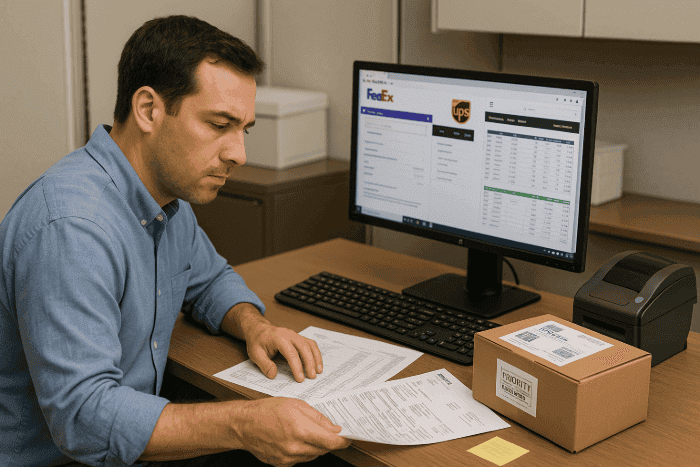In the pharmaceutical manufacturing industry, pharma logistics plays a vital role in moving time-sensitive materials such as lab samples, production inputs, and internal equipment between facilities. While freight and cold chain logistics often take center stage, the day-to-day movement of small parcels across departments is just as essential, and increasingly costly.
To help pharmaceutical teams prepare for what's next, this blog explores practical strategies to reduce parcel spend, improve visibility, and adapt to growing pressures like rising tariffs and sustainability demands. But first, let’s define what pharma logistics means today.
Table of Contents:
- What Is Pharma Logistics?
- Hidden Costs in Day-to-Day Pharmaceutical Logistics
- Logistics Challenges in the Pharmaceutical Industry
- How Airpals Simplifies Parcel Operations for Pharma Manufacturers
- Case Study: How Novartis Uses Parcel Logistics to Reach ESG Targets
- Key Takeaways
- Conclusion: Preparing for the Future of Pharmaceutical Logistics
- Frequently Asked Questions on Pharma Logistics
What Is Pharma Logistics?
Pharma logistics refers to the planning, execution, and monitoring of shipping activities in the pharmaceutical industry, covering everything from lab samples and clinical materials to internal documents and packaging components. It ensures that critical items arrive safely, on time, and in compliance with strict regulatory requirements.
While full truckload freight and cold chain solutions are crucial, parcel shipping is the backbone of everyday pharma logistics, supporting R&D, clinical operations, procurement, and administrative teams.
In 2026, as regulations tighten and operational complexity grows, pharma manufacturers need smarter, tech-enabled logistics strategies to stay efficient, compliant, and cost-effective.
Hidden Costs in Day-to-Day Pharmaceutical Logistics
When most people think of pharmaceutical logistics, they picture pallets, temperature-controlled freight, or international cargo. But every day, teams at pharmaceutical companies rely on parcel shipping to move smaller yet critical items across offices, labs, and production sites. As operations scale and teams spread across multiple locations, the need for agile, high-frequency parcel movement becomes essential.
What seems like a routine task: creating a shipment, checking carrier rates, printing labels, can quickly turn into a hidden cost. On average, operators spend over 15 minutes manually creating each shipment. Multiply that by dozens or hundreds of packages per day, and the time lost adds up to thousands of dollars in labor costs every month.
Fragmented Parcel Logistics Operations
A major contributor to these inefficiencies is decentralization. Different teams often manage their own carrier accounts using separate tools or spreadsheets, leading to:
- Lack of visibility into overall parcel spend
- Duplicate accounts with FedEx, UPS, and other carriers
- Scattered invoices and inconsistent billing
- Delays, errors, and miscommunication across departments
These gaps don’t just affect shipping teams, they impact the entire organization. Procurement struggles to forecast spend, and finance teams waste time resolving discrepancies. Without a centralized system, it becomes nearly impossible to identify inefficiencies or enforce cost-saving practices in parcel logistics.

Logistics Challenges in the Pharmaceutical Industry
The pharmaceutical industry is facing new global logistics challenges in 2026, particularly in response to evolving trade policies and shipping tariffs. Recent updates to tariff regulations have increased the cost of moving raw materials, APIs, and finished goods between production sites and global distribution hubs.
As tariffs, inflation, and operating costs rise, pharma teams are being pushed to find savings wherever possible. While most cost-reduction efforts focus on freight or supplier pricing, parcel operations often fly under the radar, despite being a daily expense across departments.
In this context, optimizing parcel shipping operations is no longer optional, it’s a strategic requirement. Companies are actively seeking ways to consolidate shipments, access discounted carrier rates, and automate invoice matching to identify unexpected charges early.
How Airpals Simplifies Parcel Operations for Pharma Manufacturers
Airpals helps pharma teams manage parcel operations more efficiently by providing the tools they need to reduce manual work, improve visibility, and centralize key processes, all without switching carriers or changing existing systems.
One Dashboard to Centralize Shipping Accounts and Activity
Our platform connects existing carrier accounts, defines user roles (such as shippers, admins, and finance reviewers), and automates tasks like label creation and invoice review. For pharma teams handling thousands of packages per year, the result is 80% less time spent managing parcel workflows and a 6–10% reduction in logistics spend.
Implementation is fast and seamless. In just a few weeks, Airpals onboards teams, processes past invoices for data centralization, and delivers real-time dashboards that track adoption, compliance, and shipping impact. Its plug-and-play design requires no developer resources and is built to scale across departments, from R&D and clinical trial logistics to supply chain coordination.
By reducing admin burden and increasing visibility, Airpals empowers pharma teams to improve cost accuracy, meet sustainability goals, and scale confidently across multi-location operations.
Case Study: How Novartis Uses Parcel Logistics to Reach ESG Targets
Novartis is a leading example of how smarter parcel logistics can support both efficiency and sustainability. With a goal of achieving full carbon neutrality in its operations, and net zero across its value chain by 2040, the company launched a project to consolidate shipments across more than 40 clinical trials.
The result: avoiding an average of 18,000 parcel shipments per year, and reducing emissions by approximately 1,400 tons of CO₂ annually.
A Logistics Approach Aligned With ESG Goals
Instead of sending materials piecemeal, Novartis grouped shipments to reduce frequency and optimize routing. This approach didn’t just lower emissions, it also minimized packaging, reduced back-office processing, and created a more predictable logistics flow.
For pharmaceutical manufacturers, this shows that parcel management isn’t just a cost center. It’s a strategic tool for meeting both operational and ESG goals.
Key Takeaways
- Pharma logistics is essential for efficient, compliant, and sustainable operations in pharmaceutical manufacturing.
- Decentralized data across departments limits visibility and slows down finance, procurement, and ESG reporting.
- AI, parcel analytics, and shipping automation are critical tools in 2026.
- Solutions like the Airpals parcel analytics dashboard help teams automate, track, and optimize all parcel-related activity.
- Companies like Novartis demonstrate that efficient parcel logistics strategies can support both cost savings and sustainability targets.
- Investing in smart parcel logistics is a strategic move for cost control and sustainability.
Conclusion: Preparing for the Future of Pharmaceutical Logistics
The future of pharma logistics depends on the ability to work smarter, not harder. As shipping volumes rise and operational complexity grows, companies that continue relying on outdated, manual processes will struggle to control costs and scale effectively.
Adopting platforms like Airpals allows pharmaceutical manufacturers to simplify parcel workflows, reduce back-office overhead, and gain full visibility into shipping activity. By centralizing carrier accounts and standardizing how teams manage shipments and invoices, Airpals helps organizations take real control of their parcel spend.
Ready to reduce parcel spend and improve logistics performance? Get in touch through our website to get a demo presentation and learn how Airpals can support your pharma logistics strategy.

Frequently Asked Questions on Pharma Logistics
What is pharmaceutical logistics?
Pharma logistics refers to the transportation, storage, and distribution of pharmaceutical products, materials, and samples, often requiring temperature control and regulatory compliance.
Why is parcel management important in pharma manufacturing?
Parcel shipping is used daily to move critical items between labs, plants, and storage facilities. Efficient management reduces cost, improves coordination, and avoids delays.
What tools can help optimize parcel spend?
Parcel analytics dashboards like Airpals help track costs, automate shipments, and consolidate data across departments to uncover savings and streamline processes.
Are new tariffs affecting pharmaceutical shipping in 2026?
Yes, tariffs are raising costs on cross-border shipments, making it crucial for companies to control internal logistics expenses more carefully.
Can parcel logistics impact sustainability goals?
Absolutely. Shipment consolidation and optimized routing can significantly reduce emissions and help pharmaceutical companies meet sustainability goals.




